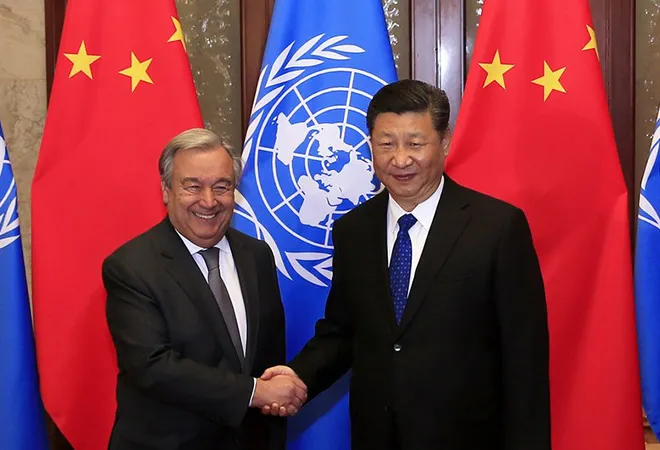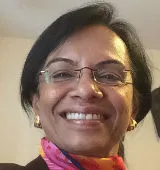
China is in assault mode to play great power politics while a divided world grapples with the Corona virus. No move is too small, no lie too big and no irony too tragic.
It is China’s second big play after 2008 when it saw the first geo-political window open with the global financial crisis and a chink in American leadership. China flexed its muscle in South China Sea, built artificial islands in a frenzy and took over disputed areas. Its tactics were incremental and designed not to provoke the United States but to get its neighbours in line.
The Corona pandemic provides China a new window to expand influence. The world is on its knees and why would China let a crisis go to waste, especially one of this magnitude? The global pandemic is an opportunity to assert, bribe and coerce – the ABC in Beijing’s book of foreign policy. Selling masks and ventilators at a profit to countries in desperate need, including the supplies that came to China as aid when it was fighting the virus, is an influence multiplier to some extent.
But nowhere are the games likely to have more lasting impact than in the United Nations, the multilateral institution used and abused in equal measure by powerful countries but still the only door to knock for a vast number of developing nations. China’s footprint is getting wider and deeper despite its paltry financial contributions.
China heads four of the UN’s 15 specialised agencies -- the Food and Agriculture Organisation (FAO), the UN Industrial Development Oraganisation (UNIDO), the International Telecommunication Union (ITU) and the International Civil Aviation Organisation (ICAO). By comparison, France, the US and the UK lead one specialized agency each even when they contribute three times the amount of money into the UN budget.
China pays only 12% of the UN budget compared to 22% by the US. So why is it that it called the shots at the World Health Organisation where it gave $44 million in 2019 compared to more than $400 million by the US government? The China story is the same across other UN agencies -- minimal money for maximum influence.
What’s more troubling is that China is increasingly in control of hundreds of bureaucratic levers of power in the vast UN system that can be used to dispense favours or deny them. It continues to capture and refashion both high- and mid-level positions where officials set the norms for the rest of the world. According to 2017 figures, Chinese nationals had 1,115 positions within the UN, including the under-secretary-general for economic and social affairs.
They are not always neutral as the UN charter requires but are often busy promoting China’s interests, going after Chinese dissidents and NGOs and keeping Taiwan out. The independence of a UN bureaucrat is directly related to the politics back home – if you are likely to be arrested or made to disappear, you toe the national government line. A former Chinese under secretary general admitted as much in a 2019 interview to China’s state-run television: “We have to strongly defend the motherland’s interests.”
It’s a two-in-one deal -- Chinese bureaucrats within the UN build a China-friendly narrative inside, and promote Chinese companies to further tighten their grip. China has already linked medical supplies to fight Corona virus to the entry of Huawei in France. It’s a bald power play with a major country to say nothing of coercing smaller countries to open their doors.
On March 30, office of the UN secretary-general announced it had signed Tencent, the $500 billion Chinese tech giant, to provide video conferencing and digital dialogue tools for the 75thanniversary. The UN press release could have been written in Beijing, so in sync it was on the importance of “international cooperation and solidarity” as “more critical than ever” when the world is fighting the pandemic.
In other words, don’t talk about China’s responsibility for the spread of the virus. The conduct of the World Health Organisation is by now well documented – how it took instructions from Beijing, repeated its official line and put millions of lives at risk. WHO chose to lose its own credibility to burnish China’s image. Calls for WHO Director General Tedros Adhanom Ghebreyesus to resign have grown along with demands for a complete makeover of the organization before the next pandemic strikes.
How can China’s voice be louder when its contributions to the WHO are smaller than those of the US? Last year China gave only about $96 million for WHO’s budget and the US gave $893 million in “assessed” and “voluntary” contributions. China is able to call the shots at the WHO and push its political agenda. Taiwan is kept out of all deliberations – its best practices are not publicised -- despite being enormously successful in curbing the Corona virus.
Last week, China was appointed to the Consultative Group of the UN Human Rights Council in Geneva, an influential panel that picks experts to investigate and monitor freedom of speech, disappearances, detentions and the right to health. Yes, health. But such cruel jokes are now routine. China, where more than a million Uighurs are imprisoned in “concentration” camps, will determine whether human rights are being violated in other countries. It will help shape standards, select monitors and decide the response on the fate of political detainees around the world.
Can other nations, especially the US, take strategic steps to contain Chinese influence in the UN? Last year, the US, India, Japan and others fought and succeeded in removing loaded Chinese language from various documents. It was a small step but it was telling.
What’s needed is a comprehensive, long-term strategy that entails more engagement by Washington, not less. At least six elections for the top position at various UN agencies are coming up – ICAO, UNIDO, Universal Postal Union, World Trade Organisation, UN Conference on Trade and Development (UNCTAD) and Comprehensive Nuclear Test Ban Treaty Organisation (CTBTO).
Countries, including India, must nominate qualified candidates to bring a semblance of balance to the UN system. And the United States must overcome its aversion to multilateral institutions – they are also part of pushing back against an aggressive China.
The views expressed above belong to the author(s). ORF research and analyses now available on Telegram! Click here to access our curated content — blogs, longforms and interviews.




 PREV
PREV


